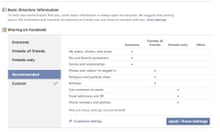After months of pressure to improve its online safety features, Facebook has reached an agreement to provide an application not dissimilar to the "panic button" critics have called for, which users can add to their homepage and links to the UK's online child protection watchdog.
Facebook has been put on the back foot in recent months and forced at first to defend its safety measures and then announce a raft of new initiatives as criticism mounted.
Founder Mark Zuckerberg acknowledged late last month that the global expansion of Facebook meant privacy controls had become too complex and that "very legitimate questions" had been raised about its failings in this area.
Now Facebook UK is to launch a new initiative with the Child Exploitation and Online Protection Centre, one of its harshest critics, to give all users the potential to access the organisation's advice and reporting centre.
The service, accessible via a ClickCeop button, includes a dedicated facility for reporting instances of suspected grooming or inappropriate sexual behaviour.
Facebook said that it marks the first time in the UK that all users, and especially the target demographic of 13-to-18-year-olds, will be able to have direct access to CEOP's services. However, the new system is opt-in, meaning that Facebook users will have to actively choose to download, add, or bookmark the new button onto their homepage.
"Our dialogue with Facebook about adopting the ClickCeop button is well documented," said Jim Gamble, the chief executive of Ceop. "Today, however, is a good day for child protection."
In April Facebook announced new measures including a £5m education and awareness campaign but declined to add the Ceop button.
Because users will have to be made aware of the existence of the new button and have to pro-actively add it to their homepage, Facebook will be running an online awareness campaign targeting members.
The campaign will include an automatic advert-message appearing on every homepage of users aged between 13 to 18 inviting them to add the application.
The new alert application will be backed by a Ceop Facebook page that, when "liked" by users, aims to help raise the profile of online safety. The page will look at topics that teenagers care about, such as celebrities, music and exams, and will link these subjects to questions about online safety.
"We know from speaking to offenders that a visible deterrent could protect young people online," said Joanna Shields, vice president of Facebook for Europe, Middle East and Africa. "There is no single silver bullet to making the Internet safer but by joining forces with Ceop we have developed a comprehensive solution... and backed this with an awareness campaign to publicise it to young users."




Comments (…)
Sign in or create your Guardian account to join the discussion